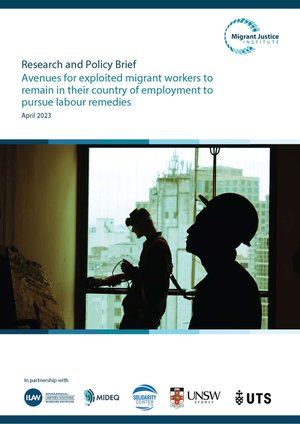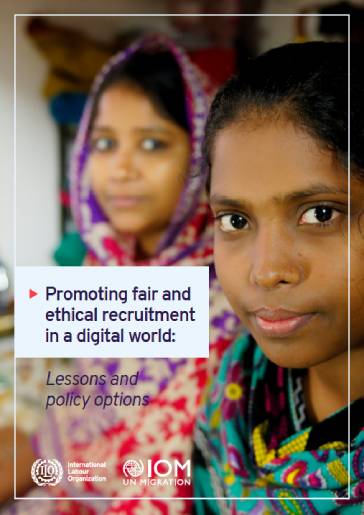Research and Policy Brief: Avenues for exploited migrant workers to remain in their country of employment to pursue labour remedies
Exploited migrant workers often don't raise complaints because they fear losing their visa or being deported. There is generally no opportunity for migrant workers to pursue wage claims at the end of their stay because they must immediately leave the country.
As a result, abusive employers are never held to account, and the vast majority return home without the wages they are owed. Pursuing claims after they leave is extremely difficult.
Governments must create migration frameworks that reduce the vulnerability of migrant workers who address exploitation, and enable exploited migrants to extend their stay for a short period in the country of employment to remedy wage theft and hold employers accountable for labour violations.
This new Research and Policy Brief sets out best practice models that governments should consider implementing, with discussion of current global examples of promising laws and policies intended to achieve these goals.
This includes current examples of
-
visa portability for exploited migrant workers to bring claims and find a new sponsor,
-
short term visas with work rights to pursue wage claims at the end of a migrant worker’s stay,
-
deferral of removal (with work rights) for undocumented workers who pursue labour claims, and
-
visas for victims of trafficking and criminal wage theft and exploitation to pursue civil labour claims.
The Brief is accompanied by a more detailed case study of recent advances in the United States.
Type of document :
Country/Region : , , , , , , , , , , ,
Year of publication :
Theme : , , , ,
The Hiring Challenge
Many of us rely on domestic workers to help care for our loved ones and manage our homes. Most of us use an employment agency to help hire the right person. Yet finding a good employment agency is fraught with problems - unlicensed businesses, illegal fees, hidden costs, and poor service.
The International Labour Organization (ILO) has launched a new immersive online gaming experience, aimed at raising awareness amongst employers of migrant domestic workers of the risks of deception and abuse faced by both workers and employers during the hiring process. It provides employers with guidance on how they can contribute towards positive change.
The Hiring Challenge casts the user in the role of a soon-to-be parent trying to hire a migrant domestic worker in Hong Kong (China) using an employment agency. The player’s task is to navigate a series of real-life choices in order to find an agency that provides a professional service, whilst at the same time not exploiting the worker they will eventually hire. The task is harder than it sounds.
The gamified experience has multiple outcomes and provides the user with recommendations on how they can improve their real-world strategy based on their final score.
The experience draws on Behavioural Insights research and is part of an ongoing collaboration with the University of Geneva to identify message frames targeting employers of domestic workers that are most likely to trigger behaviour change. The Hiring Challenge website is produced by the FAIR II project, with the support of the Swiss Development Cooperation, and is part of the wider work done globally to promote fair recruitment through the ILO Fair Recruitment Initiative .
Type of document :
Country/Region :
Year of publication :
Theme : , , , ,
Promoting fair and ethical recruitment in a digital world
This joint report by the ILO and the International Organization for Migration (IOM) explores innovative state-facilitated digital technology platforms from four different contexts, with a focus on the Employment Permit System of the Republic of Korea, Musaned from the Kingdom of Saudi Arabia, eMigrate from the Republic of India and the European Network of Employment Services.
The study maps four examples of state-facilitated digital technology platforms that assist the recruitment, placement, and/or job matching for migrant workers. In reviewing some of the promising practices and lessons learnt, the study aims to offer preliminary guidance to States developing similar online applications and platforms, while also discussing possible approaches on how to best leverage new techniques and technologies, including blockchain technology. When designed and implemented in an inclusive way, these digital technology platforms have the potential to promote institutional transparency and fairness, and can reduce the costs of labour migration and limit the potential for collusion between private recruitment agencies.
Type of document :
Country/Region : , , , ,
Year of publication :
Theme : , ,
Subscribe to the Fair Recruitment Initiative Newsletter
Sign up to receive news delivered to your inbox.



